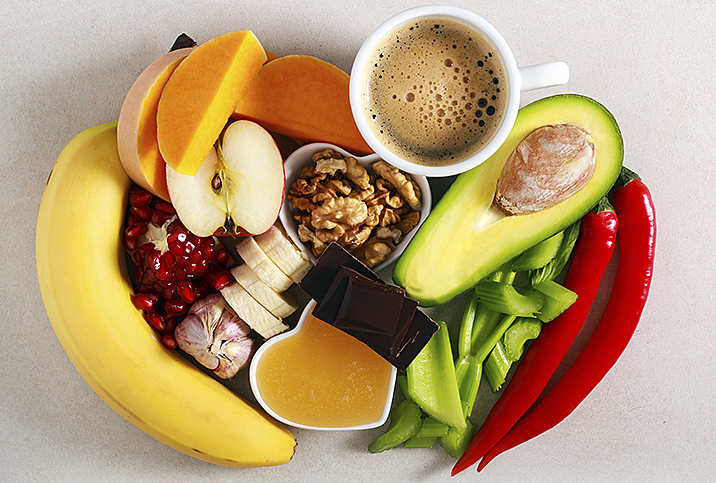Cycle Syncing Your Diet

Most biological women don't need to be told (or reminded) that our hormones affect our mood, sleep and even our appetite. From the moment we enter puberty, we ride the sometimes choppy waves of hormones in our body.
But what if we could feel less at odds with those currents and instead learned to go with the flow (pun intended) by adjusting what we eat to harmonize with our natural cycle?
Over the past several years, we have learned how to use what we eat to manage and treat illness. So, too, can diet help with the hormonal changes we experience every month. Just as we can cycle sync our exercise, we can eat in a way that coordinates with our cycle and ease some of its side effects.
A woman's hormonal cycle consists of the following four phases, in order. Read on for tips on how to adjust your diet by phase.
Early follicular phase
The early follicular phase begins the first day of menstruation, when the body is shedding the unneeded protective lining of the uterus that it created in preparation for pregnancy. In this stage, the body may crave warm foods, such as soups and stews, and experience low iron and B-12 due to blood loss.
Strive for a diet rich in lean proteins, healthy fats, omega-3 fatty acids and healthy servings of fresh fruits and vegetables. Lean toward foods that are high in iron, such as spinach and other dark leafy greens, beans, lentils, prunes, raisins and apricots.
Be sure to throw in some raspberries, too, as they are a great source of those omega-3 fatty acids. Vegetarians and vegans might consider adding an iron supplement and vitamin C during this time if they are concerned about their iron intake. Before starting any supplements, talk to your doctor, as both iron and vitamin C in large doses can be harmful.
Late follicular phase
The late follicular phase, sometimes called the proliferation phase, begins once bleeding stops and lasts approximately seven to 11 days as the body prepares for ovulation. Estrogen, follicle-stimulating hormone (FSH) and luteinizing hormone (LH) begin to increase, providing a boost in energy, mental clarity and creativity. The appetite also begins to ramp up to compensate for all of the activity.
Fill your plate with lean proteins to feel satisfied, along with vegetables high in vitamin E, including turnips, beets and mustard greens, raw sweet red peppers and butternut squash. Be sure to add avocado, kiwi, mango, blackberries and dried cranberries to the shopping list at this time.
Ovulatory phase
The ovulatory phase begins about two to four days before ovulation and extends to the day of. Levels of estrogen, LH and FSH peak, prompting a follicle (the tiny sacs of fluid inside your ovaries that contain unfertilized eggs) to release its egg, which passes down a fallopian tube in anticipation of fertilization and implantation in the uterus.
Energy intake lowers at the time of ovulation and begins to ramp up after ovulation, which may result in your appetite decreasing. Try smaller meals made up of proteins, healthy fats, cruciferous vegetables, leafy greens and citrus fruits.
Include foods rich in B vitamins and iron if you are trying to get pregnant. Foods rich in magnesium should also be on the menu, since levels of that mineral drop with ovulation.
Luteal phase
During the luteal phase (approximately days 15 to 28 in your cycle), the egg turns into a structure called a corpus luteum, which begins to release estrogen and some progesterone to build and thicken the uterine lining in preparation for pregnancy. If the egg is not fertilized, the corpus luteum disintegrates, progesterone and estrogen drop, and the cycle starts again.
During this time, you may begin to crave sweets (especially chocolate) and experience heightened emotions.
This is no time to restrict carbs. Instead, eat moderate amounts of low-glycemic (high-fiber) carbs, such as brown rice, steel-cut oats and whole-grain bread, to keep cravings at bay. Fruits filled with bioflavonoids and vitamin C, such as strawberries and citrus fruits, can also help with cravings.
Women who are pregnant, have just given birth or have experienced other biological changes that have caused a shift in hormones should not be surprised if their body doesn't conform to these cycles.
No matter the phase in your cycle or stage of life, a diet rich in fresh fruits and vegetables, whole grains, healthy fats and lean proteins is the best bet for overall good health.

















